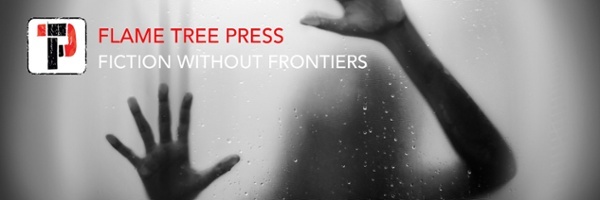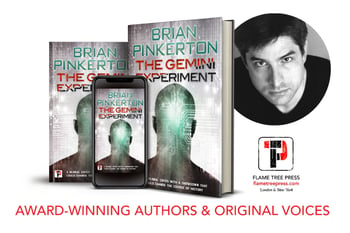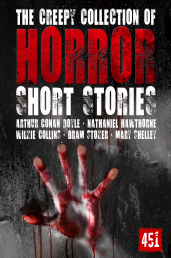Continuing with the Q&As with the authors of our May releases, today we are talking to Brian Pinkerton. He talked about his history with writing, went deep on his approach to building stories and characters and why dark fantasy intrigues him! Make sure you check back in each day this week for more Q&As with the authors of our May releases!

How did you get started writing?
My mother was a high school English teacher. When I was young, she took me on regular trips to the local library, and I would come home with stacks of books. I knew at a young age that I wanted to write my own stories.
My grandfather was a newspaper publisher in Steuben County, Indiana. He also owned a local printing press, so growing up, we always had supplies of paper all over the house. I would use them to create books, without breaking the binding. Each pad was its own book. I would write the stories and also draw the illustrations. I loved the art of Maurice Sendak and Jack Kent. I also loved comic strips like Peanuts and B.C. I wanted to be a cartoonist.
But my cartoons started taking the form of long narratives, rather than short gags. During my early teenage years, I would create epic-length cartoon stories on notebook paper and put them in three-ring binders. One was 1,000 pages long, a meandering comedy-action story featuring me and my friends facing off against a super villain. It was called “The Brats.”
How has cartooning influenced your approach to novel writing?
Mainly in my methods to capturing my creativity. To this day, I still love the experience of handwriting stories. I handwrite all my novels. I don’t start them on the computer. In this day and age, people find that very strange. But for me, it frees up my creativity. Just a pen and a blank page.
On the computer, it’s too neat and linear. I feel like every sentence has to be perfect out of the gate. But when I’m scribbling on a pad, I’m free. It’s like sketching with words.
The computer also has too many distractions. I want to check my email. I want to go on social media. I go wandering and don’t come back.
I actually write on a big drawing table in the basement. No distractions. It’s just me, the furnace, the washer and dryer, and spiders. And a very big cup of coffee.
Is your writing spontaneous or do you outline?
I definitely outline my books in advance. I like to create stories with intricate plotting and twists and turns with a deliberate rhythm. I want to pace when certain things are revealed. I like to build to a big finish that brings all the threads together. I hate writing into dead ends. I like my writing to be fast and efficient. I don’t want to throw out huge chunks of work because the story took a wrong turn.
I use index cards and a folder stuffed with scraps of paper with notes and ideas for memorable scenes and ways to link them together.
People ask if it ruins the fun of discovery for me, since I know how everything will turn out as I’m writing. The truth is that although I know where the story goes, I’m never sure of how the characters will react. For me, the fun and spontaneity is the response and development of the characters to the crazy situations I put them through.
What draws you to writing dark fiction?
I like building tension and suspense. It’s just fun to send readers on a rollercoaster ride. Sometimes it’s psychological, sometimes it’s more action-driven. Sometimes I include humor, which naturally arises out of tense situations. It’s like a relief valve.
I’ve written in the thriller, sci-fi and horror genres, but my approach is pretty consistent: I want to tell stories about ordinary people who get caught up in extraordinary situations. Often they are things that scare me. I give life to my demons and then I kill them.
What’s your approach to creating characters?
I want people to really identify with my main characters. Then I take them on a wild journey. I want the reader to think, “What would I do in this situation?”
My first goal is to engage the reader emotionally, to take a sympathetic character and thrust them into a crisis that might include their first encounter with crime or violence. My lead characters are regular people: teachers, office employees, working mothers, construction workers, book store clerks…
How did you choose your main character for your new book, The Gemini Experiment?
As I get older, I start to dwell more on mortality – the ticking clock that unites every single being on this planet. We’re not going to live forever.
Tom Nolan, the main character in The Gemini Experiment has had his life expectancy cut short by a terminal illness. He’s a young family man suddenly facing the end. He is recruited for an experiment to explore the potential for expanding lifespan through technology – the ability to digitize a human brain and upload it into a robotic reproduction of his physical self. He soon discovers he’s a pawn in a much bigger scheme that threatens the world.
I don’t want to give too much away, but it builds to the ultimate case of identity theft.
How would you describe your writing style?
My goal is momentum. I want the writing to be crisp, clear and easy to follow so your eyes glide down the page. And I want the reader to be constantly engaged by a feeling of “What happens next?” I love ending chapters with cliff hangers. I love cross-cutting between two plot threads of suspense. I want to create situations where you wonder, “How will they escape?” “How will they survive?” “How can this bad guy be stopped?”
I think that in some of my earlier books, I spent too much time on table setting – establishing characterizations, circumstances, location, backstory – before really thrusting the plot into motion. I’ve learned more about how to sprinkle those things into the narrative along the way to keep the story moving. I don’t want to bore the reader. I don’t want to bore myself!
When I edit my own work, I’m constantly tightening. Eliminating unnecessary words. Deleting adverbs, strengthening verbs. Fewer words but more impactful words. My vocabulary is relatively simple. I’m not trying to show off with gratuitous verbosity or send people in search of a dictionary. That pulls the reader out of the story. My books are entertainment, a relief from day-to-day drudgery. They shouldn’t be a chore to read.
If there’s any sophistication or attempt to be clever, it’s in the subtext, but not bogging down the sentences. I like sneaking in social commentary and satire into my books, but it’s always under the surface.
A lot of your books are set in Chicago. What do you find so compelling about the location?
Well, I’ve lived in the Chicago area for most of my life, so write what you know…
Chicago is my home. I love it, most of the time. I can plunge more quickly into the storytelling because I know the environment inside and out. The sets are already built.
Chicago has so many textures to choose from. It’s a city with great heart and soul. It’s hot, it’s cold. It’s rich, it’s poor. It’s friendly, it’s dangerous. There’s a great palette of colors to work from. Los Angeles is for dreamers, New York is for cynics, Chicago is somewhere in-between. It’s pragmatic and down to earth… a big city but still very personable.
That said, many of my books move around quite a bit. They might start or end in Chicago, but they jump around the United States or the world. The Gemini Experiment starts in Chicago, but bounces around to Florida, Washington DC, Russia…
Did you study writing?
Writing has always come naturally. And that’s probably because I read a lot as a child. I was a shy kid and preferred to express myself in writing rather than in social situations.
At the University of Iowa, I took undergraduate classes of the Iowa Writers Workshop, one of the oldest and most prestigious writing programs in the country. One of my teachers was the fiction editor of Esquire magazine. I remember he liked my literary attempts but rolled his eyes when I wrote a mystery story. He said, “Well, I guess that sort of thing is okay if you aspire to write for Alfred Hitchcock’s Mystery Magazine.” I remember thinking, “Yes, I do!” I also took American Literature classes from David Morrell, who wrote First Blood and created the character Rambo.
After Iowa, I attended Northwestern University’s Medill School of Journalism and got a master’s degree. It helped me stretch my writing skills so I could make a living with it. Not all my writing is fiction. I have a job writing for a local corporation. It helps my keep my fiction writing sharp and vice versa. A lot of the underlying requirements are the same: clear, compelling, technically accurate prose to engage a reader.
Are you related to the Pinkerton Detective Agency?
I get asked that a lot, because I have written mysteries. People ask if Pinkerton is a pen name but no, it’s really me.
Allan Pinkerton was the first private eye and founded the first detective agency. He was a spy for President Lincoln in the Civil War. He hunted Jesse James. I don’t know if I’m a direct descendant but it’s very likely we have common ancestry in Scotland.
I don’t feel that it influences the type of books I write. In fact, aside from Killing the Boss, my books don’t focus much on the detective or investigation. My themes are more Hitchcock-like…. innocent people who become entangled in crimes.
Is writing hard work or does it come easy?
Both! It’s very time consuming and challenging and can make my brain hurt, but I love it. It’s exhilarating.
Writing a novel is like going on a vacation. You get to visit new places, meet new people, have some adventures and excitement, and then return to the safety of home. The blank page is my passport.
Thank You!
Brian Pinkerton tells stories to frighten, amuse and intrigue. He is the author of novels and short stories in the thriller, horror, science fiction and mystery genres. His books include Abducted (a USA Today bestseller), Vengeance, Anatomy of Evil, Killer's Diary, Rough Cut, Bender, Killing the Boss and How I Started the Apocalypse (a trilogy). Select titles have also been released as audio books and in foreign languages. His short stories have appeared in PULP!, Chicago Blues, Zombie Zoology and The Horror Zine. 
- FLAME TREE PRESS | May Releases | 1 | Hunter Shea Q&A
- FLAME TREE PRESS | May Releases | 2 | Brian Pinkerton Q&A
- FLAME TREE PRESS | May Releases | 3 | Melissa Prusi & Steven Hopstaken Q&A
- FLAME TREE PRESS | May Releases | 4 | Jonathan Janz Q&A
- FLAME TREE PRESS | May Releases | 5 | Upcoming Titles




